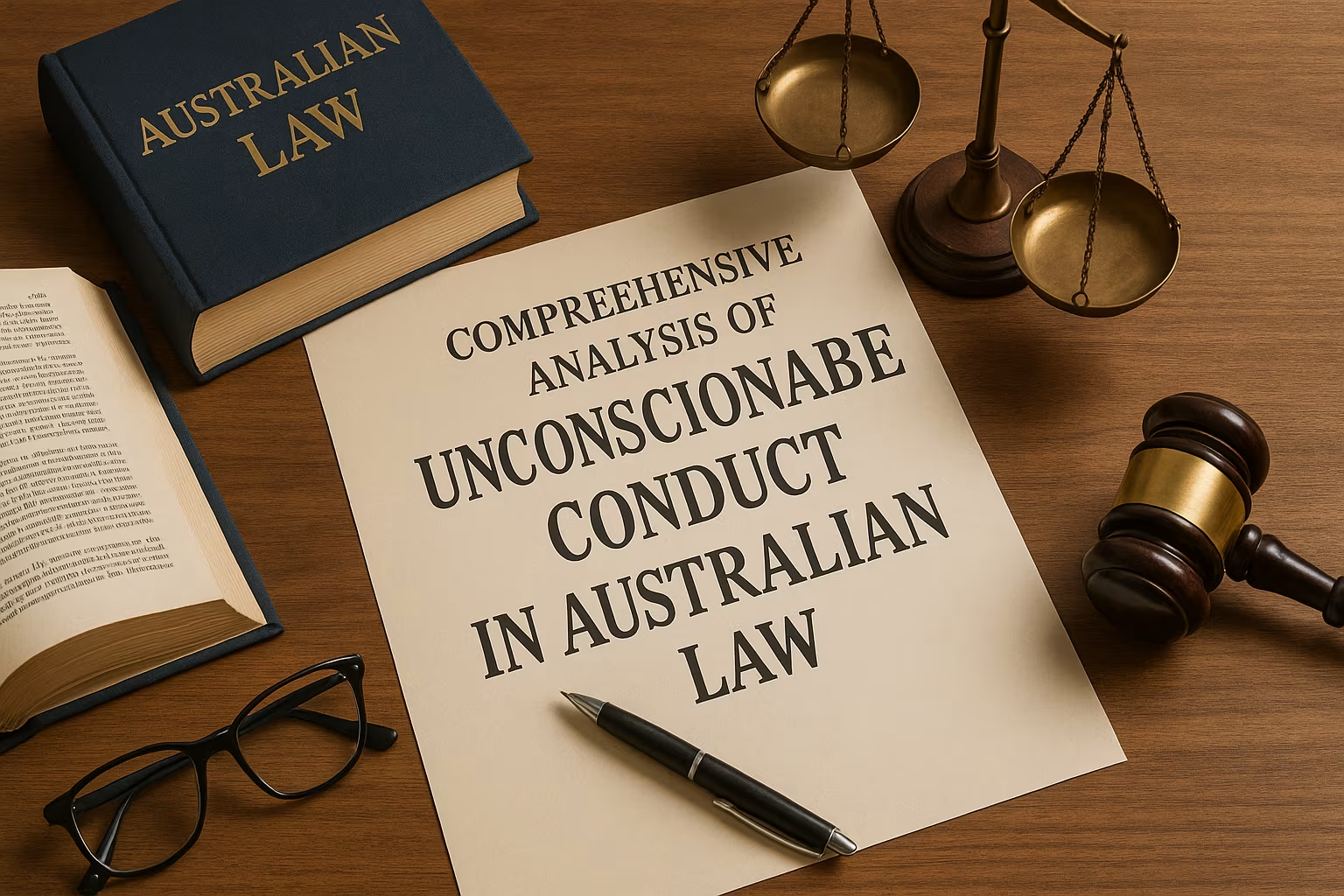Comprehensive Analysis of Unconscionable Conduct in Australian Law
📘 Comprehensive Analysis of Unconscionable Conduct in Australian Law
In Australian law, unconscionable conduct is a key concept in consumer protection and contract law, primarily governed by the Competition and Consumer Act 2010 (CCA) (previously the Trade Practices Act 1974). It prohibits businesses from engaging in unfair, unethical, or exploitative behavior, particularly when dealing with consumers, small businesses, or vulnerable parties.
Unconscionable conduct is a critical legal doctrine in Australia, protecting consumers, small businesses, and vulnerable parties from exploitative commercial practices. This analysis explores:
- ⚖️ Legal Framework (statutory and equitable principles)
- 🔍 Elements of Unconscionability (procedural vs. substantive)
- 📚 Key Case Law (landmark rulings and recent developments)
- 🛡️ Regulatory Enforcement (ACCC’s role and penalties)
- 🌍 Comparative Perspectives (how it differs from similar doctrines)
- 🏢 Practical Implications (for businesses and consumers)
1. ⚖️ Legal Framework Governing Unconscionable Conduct
A. Statutory Provisions (Australian Consumer Law – CCA Schedule 2)
The Competition and Consumer Act 2010 (CCA) prohibits unconscionable conduct under:
- 📌 Section 20: General prohibition in trade or commerce (applies to B2B and B2C).
- 📌 Section 21: Specific prohibition in consumer transactions (individuals, not businesses).
- 📌 Section 22: Non-exhaustive list of factors courts consider (e.g., bargaining power, undue influence, industry norms).
Key Differences Between Sections 20 & 21:
| Aspect |
Section 20 (General Law) |
Section 21 (Consumer Law) |
| Applies to |
Businesses & individuals |
Only consumers (not businesses) |
| Standard of Proof |
Higher (equitable principles apply) |
Lower (broader protection) |
| ACCC Enforcement |
Yes (civil penalties) |
Yes (stronger consumer focus) |
B. Equitable Unconscionability (Common Law Doctrine)
Separate from statutory law, courts may intervene under equity where:
- 🧓 One party suffers a special disadvantage (e.g., age, illness, language barriers).
- 🤝 The stronger party knowingly exploits this disadvantage.
- ⚠️ The transaction is manifestly unfair.
Case Example: Commercial Bank of Australia v Amadio (1983) – Elderly Italian migrants with limited English were pressured into signing a mortgage guarantee for their son’s failing business. The High Court ruled the bank acted unconscionably by failing to explain risks.
2. 🔍 Elements of Unconscionable Conduct
A. Procedural Unconscionability (Unfair Process)
Focuses on how the agreement was formed, including:
- ⚖️ Unequal bargaining power (e.g., large corporation vs. individual).
- 💼 High-pressure tactics (e.g., door-to-door sales to elderly).
- 🔒 Lack of transparency (hidden terms, complex jargon).
- 🚫 No real opportunity to negotiate (take-it-or-leave-it contracts).
B. Substantive Unconscionability (Unfair Terms)
Examines whether the terms themselves are oppressive, such as:
- 💸 Exorbitant prices or interest rates (e.g., payday loans at 400% APR).
- 🧾 Unfair forfeiture clauses (e.g., losing a deposit for minor breaches).
- 🔁 Unilateral termination rights (one party can cancel, but not the other).
Case Example: ACCC v Quantum Housing Group (2021) – A property manager imposed unfair lease terms on Indigenous tenants, including excessive fees. The Federal Court found this substantively unconscionable.
3. 📚 Key Case Law & Judicial Trends
A. Landmark Cases
- 📖 Commercial Bank of Australia v Amadio (1983) – Established equitable unconscionability.
- 🧹 ACCC v Lux Distributors (2013) – Deceptive vacuum cleaner sales to elderly = unconscionable.
- 🔁 Kobelt v ACCC (2019) – High Court ruled that informal lending to Indigenous customers was not unconscionable because they understood the terms.
B. Recent Developments
- 🍏 ACCC v Apple (2022) – Apple’s refusal to repair devices under warranty was found unconscionable.
- 🏚️ ACCC v We Buy Houses (2023) – Property investors exploiting distressed homeowners faced penalties.
Judicial Approach: Courts now consider:
- ✔️ Industry standards (what’s normal in the sector).
- ✔️ Consumer vulnerability (e.g., financial distress, disability).
- ✔️ Systemic misconduct (repeat offenders face higher penalties).
4. 🛡️ Regulatory Enforcement & Penalties
A. ACCC’s Role
The Australian Competition & Consumer Commission (ACCC) actively investigates and prosecutes unconscionable conduct by:
- 📞 Investigating complaints (consumers can report via ACCC.gov.au).
- 📋 Issuing infringement notices (fines without court action).
- ⚖️ Pursuing civil penalties (up to $50 million for corporations).
B. Penalties & Remedies
| Remedy |
Description |
| Civil Penalties |
Up to 2.5M for individuals, 50M+ for corporations. |
| Compensation Orders |
Victims can recover losses. |
| Injunctions |
Court orders to stop unfair practices. |
| Contract Rescission |
Unfair agreements can be cancelled. |
Example: In ACCC v Medibank (2020), the insurer was fined $5M for misleading customers about policy changes.
5. 🌍 How It Differs from Related Doctrines
| Doctrine |
Key Difference |
| Misleading Conduct (s18 ACL) |
Requires deception, not just unfairness. |
| Unfair Contract Terms (s23-24 ACL) |
Applies only to standard-form contracts. |
| Duress |
Involves threats or coercion. |
| Undue Influence |
Requires a relationship of trust (e.g., doctor-patient). |
6. 🏢 Practical Implications
For Businesses:
- ✅ Avoid exploitative terms (e.g., hidden fees, excessive penalties).
- ✅ Train staff on ethical sales practices (especially with vulnerable consumers).
- ✅ Ensure transparency (clear contracts, plain language).
For Consumers:
- ✅ Know your rights – Unfair contracts can be challenged.
- ✅ Report misconduct to ACCC or state agencies (e.g., NSW Fair Trading).
- ✅ Seek legal advice if pressured into unfair deals.
Unconscionable conduct in Australian law is a powerful tool against exploitation, blending statutory and equitable principles. Businesses must act in good faith, while consumers should be vigilant against unfair practices. With the ACCC’s increasing enforcement, courts are taking a stricter stance against systemic unfairness.
If you have been unfairly, unethically or exploited in trade or business, please contact SDC Lawyers.
 18 May 2025
18 May 2025